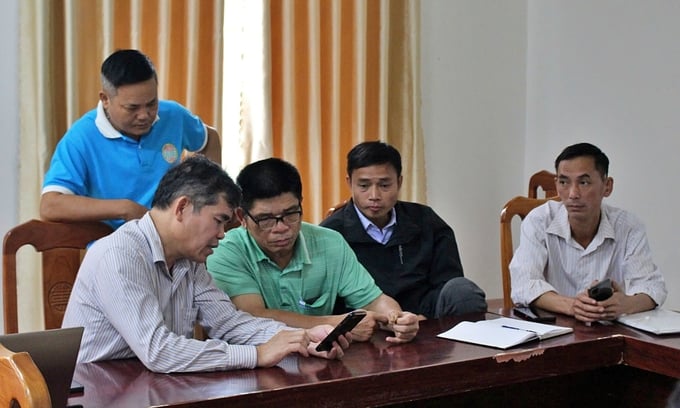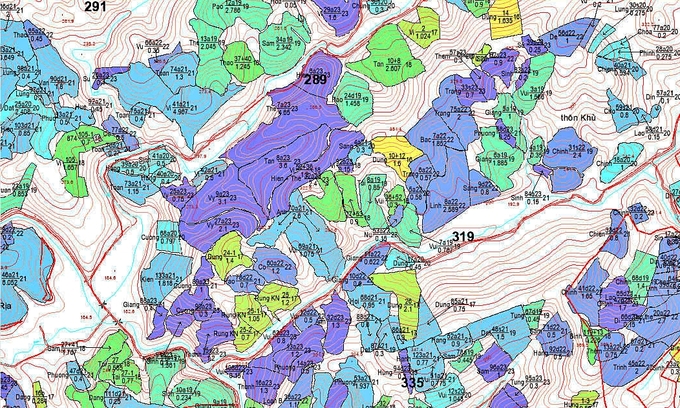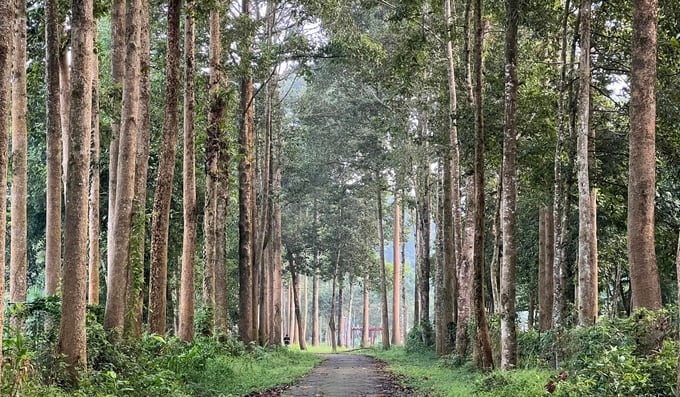May 24, 2025 | 16:18 GMT +7
May 24, 2025 | 16:18 GMT +7
Hotline: 0913.378.918
May 24, 2025 | 16:18 GMT +7
Hotline: 0913.378.918

Dr. Hoang Lien Son guides people in using the iTwood system to issue forest production unit codes. Photo: Bao Thang.
The legal origin of wood products is one of the most essential requirements for Vietnam's two main export markets, the US and the EU. This is considered a vital factor for export enterprises.
According to a survey by the Forest Trends research group led by To Xuan Phuc, wood materials in Vietnam come from: domestically planted wood (acacia, eucalyptus, and fat); Wood from domestic mixed gardens; Imported planted timber (pine, ash, eucalyptus, and acacia) and Imported natural wood.
The wood expert acknowledged that many wood products in the group of bedroom furniture, office furniture, kitchens, and wooden furniture parts exported to the EU are processed from areas that were previously forests converted to rubber plantations. When using this wood source, businesses face challenges in traceability and transparency and accountability, especially the requirement to clearly state the names of all types of wood used in exported products.
Another factor pointed out by Phuc is evidence related to the legality of raw wood sources, including wood names and commercial invoices. Some countries also require other evidence, such as forest product lists, raw wood purchase invoices, or logging licenses. Through assessment, the Forest Trends group found that the ability of businesses to present relevant evidence is significantly different from market requirements.
Dr. Hoang Lien Son, Director of the Center for Forestry Economics Research (Vietnamese Academy of Forest Sciences - VAFS), said that for a long time, the wood industry has been struggling with the distinction between "legality" and "legal" of raw wood sources.

Actual image of forest plantation planning at Yen Son Forestry Company Limited, Tuyen Quang. Photo: Bao Thang.
Decree 120/2024/ND-CP amending Decree 102 has removed confiscated processed wood from the list of legal wood. Son said that this has significantly reduced risks related to the origin of wood, especially raw wood, when participating in the supply chain and exporting abroad.
According to Son, legality is an attribute of wood, meaning that all must comply with regulations from the preparation of input materials (seeds, planting soil, forestry measures, etc.). It is also necessary to provide relevant evidence to ensure transparency, accountability, and traceability to the planting area.
The dynamic QR code technology of the iTwood system solves these problems. Each stage in the supply chain, including production, harvesting, processing, commercialization, etc., has a QR code so that consumers and management agencies can clearly understand the information. In other words, when the wood is guaranteed to be “legal” or “legality” is an attribute of the wood, the risks will be automatically resolved.
Up to now, Decree 102 (or currently Decree 120) has been the legal basis for Vietnamese enterprises to fulfill their accountability responsibilities. This is considered a "passport" for Vietnamese wood to enter the US and EU markets... However, when purchasing raw wood, many places still use records and documents instead of digital transformation in wood traceability management.
Implementing the direction of Deputy Minister of Agriculture and Rural Development Nguyen Quoc Tri, aiming for a sustainable forestry industry and becoming a high-value-added technical, economic sector, the Department of Forestry has guided localities and enterprises to remove bottlenecks related to the legality of raw wood, including the issuance of forest planting area codes.

Granting forest production unit codes will significantly increase the value of the forestry industry. Photo: Hong Luong.
Based on the iTwood system, wood enterprises collect and store legal records of wood from upstream suppliers (forest owners, wood exporters, etc.) to the production process of finished products. All information about the origin and legality of wood will be shown through the plantation area code. Through the simple operation of scanning the QR code, businesses will save a lot of costs, time, and human resources for archiving, proving, and verifying the origin of wood.
In the long term, the plantation area code will be an important input for activities such as granting sustainable forest management certificates, paying for forest environmental services, or adapting to strict international regulations such as EUDR (EU Deforestation-free Regulation).
Dr. Ha Cong Tuan, Chairman of the Association of Agricultural Economics and Rural Development and former Permanent Deputy Minister of Agriculture and Rural Development, commented that Vietnam still has about 1 million hectares of forestry land for forest regeneration. The potential for new planting in our country is not much, because in this 1 million hectares, more than 300,000 hectares are rocky mountains and many wetlands.
"According to the recently issued national forestry plan, Vietnam's forest area is stable, ensuring a 42-43% coverage rate. Therefore, digitizing management work is a necessary and feasible task at this time," Tuan emphasized.
Translated by Huong Giang

(VAN) The mutual export of agrifood products between the European Union (EU) and the United Kingdom (UK) must occur again without certification, border controls or other red tape. This was agreed at the UK-EU summit.
/2025/05/22/5121-2-173645_677.jpg)
(VAN) NBSAP Tracker identifies strengths and areas for improvement in the National Biodiversity Strategy, based on each region’s priorities and capacities.

(VAN) The draft amendment to the Circular on rice export trading stipulates a periodic reporting regime for rice exporting enterprises.

(VAN) Dong Thap farmers attained an average profit margin of 64% during the summer-autumn 2024 crop (first season), while An Giang and Kien Giang farmers followed with 56% and 54%, respectively.

(VAN) As a doctoral student doing research on renewable energy and electrification at Harvard University, the author shares his musings on electricity, nature, and countryside memories.

(VAN) The decree on Extended Producer Responsibility (EPR) ensures transparent management and disbursement of support funds, avoiding the creation of a “give-and-take” mechanism.

(VAN) Hue City rigorously enforces regulations regarding marine fishing and resource exploitation, with a particular emphasis on the monitoring of fishing vessels to prevent illegal, unreported, and unregulated (IUU) fishing.